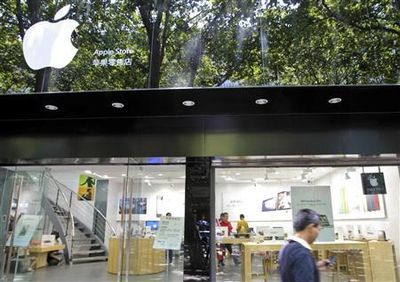Apple's Anti-Counterfeiting Efforts in Asia Hampered by Uncooperative Authorities
CNN reports on details of Apple's anti-counterfeiting efforts centered in China, noting that the company has had difficulty winning the cooperation of Chinese authorities to investigate and shut down those responsible for the fake Apple products. The details were revealed in documents from U.S. diplomatic cables published by WikiLeaks last week.
The technology giant eventually organized a team in March 2008 to curtail the explosion of knockoff iPods and iPhones, according to an electronic memo from the Beijing embassy dated September 2008.
Yet, three years after Apple moved to crack down on widespread counterfeiting and put pressure on China, progress has been slow. Gadget piracy isn't a high priority for the Chinese government, the U.S. reports and experts say.
The reports note that Apple's efforts have been led by vice president for global security John Theriault, a former FBI special agent and Pfizer vice president who was hired by Apple after he led a campaign against production of counterfeit prescription drugs. Theriault was joined at Apple by his Pfizer associate Don Shruhan, who now serves as a director with Apple's security team in Hong Kong.
 Counterfeit Apple store in Kunming, China
Counterfeit Apple store in Kunming, ChinaDespite putting the anti-counterfeiting task force together, Apple has had only limited success as Chinese authorities have been reluctant to respond to Apple's requests for assistance. Apple has tried to convince authorities to take a more active role by citing the potential dangers of exploding batteries in counterfeit products and the loss of tax revenue associated with the knockoff products, but Chinese authorities have cited their own reasons for not pursuing the claims.
The arguments weren't very effective. China's government declined to investigate a facility in March 2009 that was manufacturing imitation Apple laptops because it threatened local jobs, says a cable dated April 2009. A different arm of China's government scrapped plans for a raid on an electronics mall in the Guangdong province because it could have driven away shoppers, the cable says.
Last month, several counterfeit Apple retail stores in China gained significant publicity after being highlighted by a popular blog. Two of those stores were closed over permit issues, but dozens more stores have since been discovered. Apple has also sought to crack down on knockoff products in the United States, having recently filed suit against a pair of businesses in New York City selling such goods.
Popular Stories
Apple will launch its new iPhone 17 series in two months, and the iPhone 17 Pro models are expected to get a new design for the rear casing and the camera area. But more significant changes to the lineup are not expected until next year, when the iPhone 18 models arrive.
If you're thinking of trading in your iPhone for this year's latest, consider the following features rumored to be coming...
In select U.S. states, residents can add their driver's license or state ID to the Wallet app on the iPhone and Apple Watch, providing a convenient and contactless way to display proof of identity or age at select airports and businesses, and in select apps.
Unfortunately, this feature continues to roll out very slowly since it was announced in 2021, with only nine U.S. states, Puerto Rico,...
Since the iPhone X in 2017, all of Apple's highest-end iPhone models have featured either stainless steel or titanium frames, but it has now been rumored that this design decision will be coming to an end with the iPhone 17 Pro models later this year.
In a post on Chinese social media platform Weibo today, the account Instant Digital said that the iPhone 17 Pro models will have an aluminum...
Three out of four iPhone 17 models will feature more RAM than the equivalent iPhone 16 models, according to a new leak that aligns with previous rumors.
The all-new iPhone 17 Air, the iPhone 17 Pro, and the iPhone 17 Pro Max will each be equipped with 12GB of RAM, according to Fixed Focus Digital, an account with more than two million followers on Chinese social media platform Weibo. The...
Apple is expanding the ability to add an Apple Account Card to the Wallet app to more countries, according to backend Apple Pay changes.
With iOS 15.5, Apple updated the Wallet app to allow users to add an Apple Account Card, which displays the Apple credit balance associated with an Apple ID.
If you receive an Apple gift card, for example, it is added to an Apple Account that is also...
Apple does not plan to refresh any Macs with updated M5 chips in 2025, according to Bloomberg's Mark Gurman. Updated MacBook Air and MacBook Pro models are now planned for the first half of 2026.
Gurman previously said that Apple would debut the M5 MacBook Pro models in late 2025, but his newest report suggests that Apple is "considering" pushing them back to 2026. Apple is now said to be...
Apple is continuing to refine and update iOS 26, and beta three features smaller changes than we saw in beta 2, plus further tweaks to the Liquid Glass design. Apple is gearing up for the next phase of beta testing, and the company has promised that a public beta is set to come out in July.
Transparency
In some apps like Apple Music, Podcasts, and the App Store, Apple has toned down the...
If you pay for iCloud storage on your iPhone, did you know that Apple offers you five perks beyond the extra storage space, at no additional cost?
Here are the perks included with all iCloud+ plans:Private Relay keeps your Safari browsing history entirely private from network providers, websites, and even Apple.
Hide My Email generates unique, random email addresses whenever needed.
Hom...




















